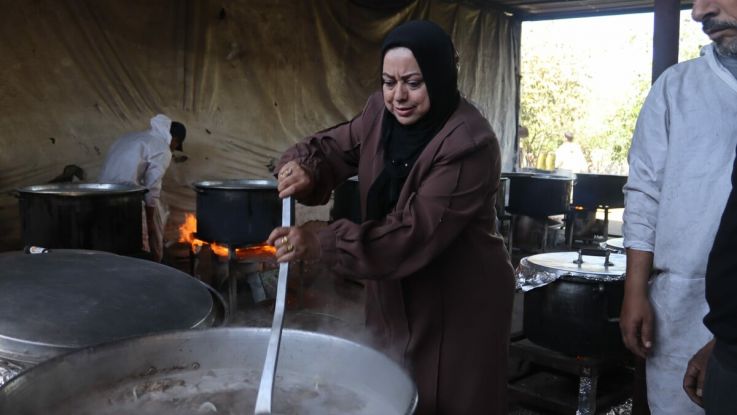Climate crisis: whose responsibility?
21 June 2023
In this guest blog, read why Mishita, an ActionAid UK Community Campaigner, thinks accountability is important in the fight for climate justice.

Steven and Joyce work for Action Aid in Tanzania. Here they are at house ruins in the village Njinjo in southern Tanzania which was completely destroyed by flash floods in 2020 killing some villagers and displacing hundreds. Photo: William Vest-Lillesøe/ActionAid
The year is 2000. British Petroleum (BP) has unveiled the idea of a “carbon footprint calculator” to the world. What was yet to be revealed was how this was one of the first steps in the clever shifting of responsibility for the condition of our dying planet from corporations that spill thousands of gallons of oil into the oceans, onto individuals that run the tap too long whilst brushing.
The year now is 2023. I am a student, which is already financially taxing, with the cost of living at an all-time high. Yet when I run to the supermarket to buy milk, I wonder, dairy or dairy free?
As of 2019, the dairy industry contributes 3.4% of all greenhouse gas emissions. And when I scroll through Instagram, I see countless posts on how to reduce my carbon footprint, why I should use paper straws not plastic, should reduce, reuse, recycle, make new clothes out of old, use soap that degrades right back into the Earth, use a different search engine to plant more trees, and use a “greener” energy source while the cost of energy rises.
None of these are bad practices; they are all extremely useful. But, while we all try our best to hold ourselves accountable, who does the same for the companies responsible for 71% of all greenhouse gas emissions1 ?
Who is accountable for climate justice?
Accountability could look like governments regulating these corporations if they are working in their jurisdictions.
But what does it mean to be carbon-neutral as a country if the planet isn’t?
When net-zero carbon emissions from one country mean dumping all the polluting factories onto another country, mainly in the global south, we are not eliminating carbon emissions; we are simply transferring them into another country – this process is called carbon leakage.
This especially happens in countries with weaker environmental regulations, such as Trinidad and Tobago, Bosnia, and Slovakia, where carbon emissions are significantly higher relative to their GDP. Because in a capitalist economy, corporations are driven by profit above all to shift productions where their practices won’t be constrained by regulations.
It’s not a question of straws but a lack of global regulations for corporations that affect the environment far more than individuals."
What is required is a more global perspective beyond country borders to consider the health of Earth as a whole.
Multi-national companies whose foreign investments account for 18.7% of global carbon emissions2 must prioritise the needs of the local communities and the impact of these investments on the environment.
It’s not a question of straws but a lack of global regulations for corporations that affect the environment far more than individuals.
What is the solution to climate crisis?
Individual actions are not futile, but there must be a greater emphasis on advocating for collective, large-scale actions from corporations and governments themselves to move towards a greener future for all of Earth.
If you’d like to join the fight for a just, feminist green future, become an ActionAid UK Community Campaigner.



